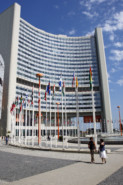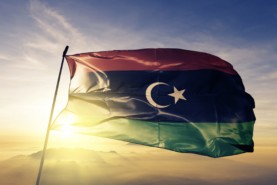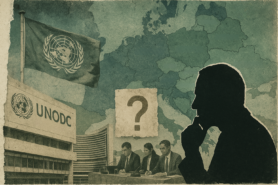Posted on 12 Feb 2018
The role of civil society in the UN Conventions against Transnational Organized Crime (UNTOC) and against Corruption (UNCAC) has been a contested issue. Although the importance of civil-society participation is referred to in the convention’s’ principles, there is no mandatory provision for it among states parties. In an interview with the Global Initiative’s Julia Stanyard, Ugi Zvekic explores the issue further.
What would you say is the fundamental issue regarding the role played by civil society in the UN’s conventions on organized crime and corruption?
To answer that, first let me highlight the key role played by civil society in another important piece of UN machinery: in the UN Declaration and Charter of Human Rights. This is an important piece of UN machinery. In that charter there is the Universal Periodic Review. This is a review mechanism whereby countries act like peer reviewers, visiting the other countries under review. The country under review prepares a report on the state of human-rights issues there. The charter envisages a mandatory role for civil society. In other words, there is a compulsory report that must be prepared by civil-society actors on issues of human rights in the countries reviewed. So, this charter recognizes the important role of civil society.
It is not that the Universal Periodic Review is unproblematic. As you know, human rights are politically very sensitive and some governments tend to be uncooperative with civil society. It is not that the review process works perfectly by any means. But the fact remains that the instrument itself, the charter, recognizes and mandates the role of civil society.
By contrast, in the crime arena – where the two most important conventions are UNTOC and the UN Convention against Corruption (UNCAC), which are equivalent to the charter – for some very strange reason, there is no recognition of the role of civil society whatsoever. Civil society, according to the UNTOC and UNCAC review mechanisms, has no say in the review process. UNCAC is far more flexible in terms of providing some space for informal input, but the fact remains that it’s not mandatory: it depends very much on the will of the governments, who can decide to what extent they will take it into consideration.
How does the non-mandatory role of civil society play out in practice?
It’s very dependent on the government. As I said, UNCAC looks to enhance the position and role of civil society, less so in the case of UNTOC. This begs the question, are these two issues, organized crime and corruption, somehow less politically sensitive than human rights? I wouldn’t say so. But some countries have very rigid attitudes towards the involvement of civil society and the whole review mechanism, and even the participation of civil society in the making of resolutions that the conference of the states parties adopt each time they meet. And this is much more, I would say, restricted when it comes to UNTOC than UNCAC. So, we can see a kind of hierarchy here, where, in the human-rights charter civil society impacts on the entire process; then there is UNCAC, which formally tries to involve civil society but its role is dependent on the political will of the government in question; and then UNTOC, where civil society is not involved at all.
You described the lack of recognition of civil society as ‘very strange’. What would you say are the reasons for this?
I think maybe some countries have felt that, because of the Universal Periodic Review, there is too much interference by civil society in the review mechanism. I think they took a very – I will not say antagonistic – but very reserved position towards civil society. I also think that some of the governments don’t appreciate the input of civil society because it is more often than not critical towards them. This is particularly the case when it comes to corruption and, but also about organized crime. There is the institutional and legal possibility to introduce certain provisions in the review mechanism that would allow for greater participation of civil society – but that is not happening. There is a political and legal possibility, if you like, for greater involvement. But, for now, things are not moving in that direction.
Why do you not think it is not moving in that direction?
For the same reason that it was not placed in the instrument itself. I think it is an ideological issue besetting some governments – not all of them – but, then again, you’ve got to work on a consensus basis or it’s impossible to vote on these things. It’s not done. It’s not that it’s impossible – but it’s not done.
And, then, the whole area of civil-society involvement is much less developed in UNTOC than in UNCAC. UNTOC has one article that deals with prevention in civil society, whereas UNCAC has a whole chapter that deals with it.
What is it that the conventions lose from not having the input of civil society?
First of all, they lose what both of the conventions proclaim in their opening principles. Both refer to the role and importance of civil society in the fight against organized crime and corruption. The problem is, if this is not followed up through legislative provision or a mechanism allowing for such a role, then these opening declarations are undermined and they become nothing more than mere ideological statements. The conventions create an expectation for civil society to be engaged in preventing organized crime and corruption but, then, they do not provide for fully fledged civil-society participation in the review process. It’s an obvious contradiction.
Secondly, there are problems of an operational nature. For example, at the last UNCAC conference of the states parties, there were a lot of complaints from civil-society representatives. For example, some of them were not given visas and were unable to participate in the Vienna conference. Of course, it is not the UN secretariat that issues visas, it is the host country but, all the same, it’s self-evident that if the host country restricts visas because of migration problems and does not enable civil society to attend the conference of states parties, it means that representatives cannot participate – even to the limited extent that the convention allows.
There are therefore both political and operational issues, and these have created a lot of unease among the civil-society community that came to the last UNCAC conference. Some are even talking about not participating at the next one. So, ironically, we are in a worse situation today than we were several years ago, when the global migration issue was not such a crisis. So the migration issue, and the positioning of certain governments towards it, is reflected now on the civil society participation in the conference of the state parties, so you can see everything is really related and interconnected: nothing stands in isolation. So you can see, nothing stands in isolation.
What do you see as the way forward?
Two things: one is that civil society needs to be more active, it needs to mobilize and put pressure on governments, particularly those that oppose the participation of civil society in the review mechanism. Secondly, at the same time, we need to exert pressure on those governments that are amenable to the participation of civil society, so that, through diplomatic channels, they can convince those that are against civil society to view things in a different way. They need to be persuaded that civil-society involvement does not mean the end of the world for them. To do this, they need to draw on, and take their cue from, the precedent established successfully by the charter on human rights



